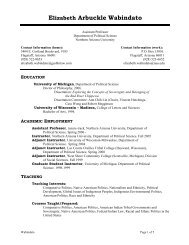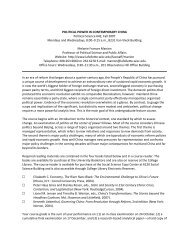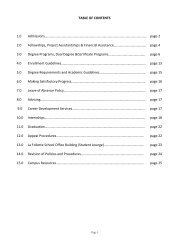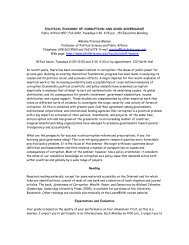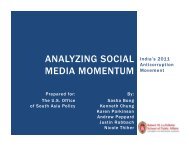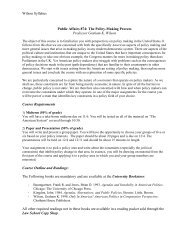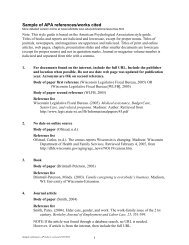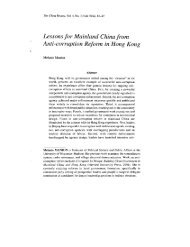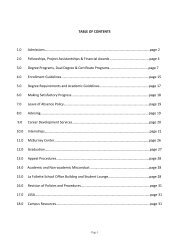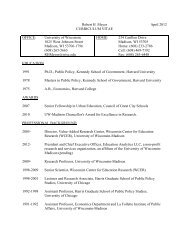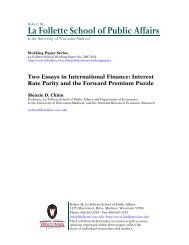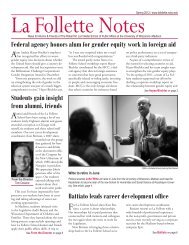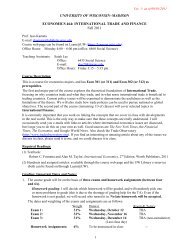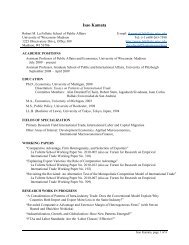SAVE Commission's findings - La Follette School of Public Affairs ...
SAVE Commission's findings - La Follette School of Public Affairs ...
SAVE Commission's findings - La Follette School of Public Affairs ...
Create successful ePaper yourself
Turn your PDF publications into a flip-book with our unique Google optimized e-Paper software.
“The Japanese use the library<br />
function and technology together<br />
to accomplish business and<br />
organizational goals.”<br />
James Matarazzo, consultant, Boston, MA<br />
tage <strong>of</strong> the worldwide University <strong>of</strong> Wisconsin<br />
alumni network to develop markets.<br />
Even though it is unconventional, why<br />
does this approach make sense? It plays to<br />
Wisconsin’s strengths: smart work force, quality<br />
products, honest relationships, great University<br />
and good government.<br />
It accepts the<br />
fact that in a global marketplace<br />
knowledge is<br />
easily transportable,<br />
important for us in the<br />
Midwest.<br />
There are barriers,<br />
not the least <strong>of</strong> which is<br />
that this is a new way<br />
to think about economic development. There<br />
are issues <strong>of</strong> proprietary information, state<br />
policy, logistics and accounting. The potential<br />
is clear, however, because <strong>of</strong> the clear global<br />
focus on an image <strong>of</strong> the new knowledge-age<br />
economy as envisioned by Peter Drucker and<br />
others.<br />
Also, there are spin-<strong>of</strong>f opportunities.<br />
There could be a more organized partner city<br />
program or special cooperative efforts with<br />
other world class universities. Some <strong>of</strong> the foreign<br />
customers may want to come to Wisconsin<br />
for continuing education, tourism or job<br />
training.<br />
For the public employee, this strategy<br />
means an increased emphasis on lifelong learning<br />
and the need to be connected to the information<br />
superhighway. The reward for advising<br />
others on how to clean the environment, protect<br />
public health or teach children goes beyond<br />
a paycheck. The work values the public<br />
employee for her or his knowledge capacity (see<br />
Goal #20).<br />
For the University,<br />
it means finding ways<br />
to integrate and reward<br />
faculty participation in<br />
the process and being<br />
on call to meet customer<br />
needs (see Goal<br />
#13).<br />
For state government,<br />
it will require looking at the benefits and<br />
risks <strong>of</strong> creating a privately managed buffer<br />
between the state employee and the private sector.<br />
It will mean looking for ways to encourage<br />
knowledge sectors <strong>of</strong> the economy. It will mean<br />
being comfortable with a high-tech, customerdriven<br />
consortium which will organize and market<br />
Wisconsin knowledge.<br />
The firm will use a variety <strong>of</strong> electronic,<br />
fiber optic, digitized and wireless channels to<br />
gain access to the knowledge information it<br />
needs and distribute it to customers (see Goal<br />
#12). In the end, Wisconsin can become a recognized<br />
participant not only in the world<br />
economy, but in the world community.<br />
Actions<br />
9.1<br />
Sell intellectual capital<br />
in the knowledge<br />
economy.<br />
9.2<br />
Aggressively tap<br />
Wisconsin’s Knowledge<br />
Capacity for state use.<br />
Leona Fitzmaurice,<br />
Bioissues, Madison<br />
“To transfer their<br />
research to the<br />
marketplace, university<br />
researchers must<br />
become entrepreneurial<br />
or align with organizations<br />
already engaged in<br />
entrepreneurial efforts.”<br />
Ralph Stayer,<br />
Johnsonville Foods,<br />
Kohler<br />
“Government’s role is to<br />
promote the free trade<br />
<strong>of</strong> knowledge.”<br />
R E S U L T S<br />
The knowledge<br />
economy will:<br />
1 Impact citizens by improving the<br />
national and international market for<br />
Wisconsin knowledge.<br />
2 Change the contribution <strong>of</strong><br />
government to economic<br />
development by focusing on the<br />
role <strong>of</strong> government as investor and<br />
promoter <strong>of</strong> knowledge.<br />
3 Improve the equality <strong>of</strong> contributions<br />
that all sectors <strong>of</strong> Wisconsin<br />
can make to the knowledge<br />
capital <strong>of</strong> the state: not a<br />
monopoly, but a consortium.<br />
4 Change the contribution <strong>of</strong> the<br />
state university system as a<br />
source <strong>of</strong> knowledge to a source<br />
<strong>of</strong> human capital network for the<br />
private and public sector.<br />
5 Change the view <strong>of</strong> state employees<br />
from regulators <strong>of</strong> the economy to<br />
contributors and participants, as<br />
good government becomes a<br />
marketable commodity.<br />
6 Remove government as a barrier to<br />
the growth <strong>of</strong> new environmentally<br />
safe products <strong>of</strong> Wisconsin industry.<br />
CITIZEN • COMMUNITY • GOVERNMENT — WISCONSIN: THE 21 ST CENTURY 29



